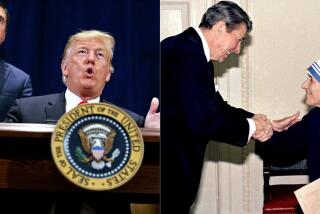It Was Reagan Who Tore Down That Wall
- Share via
As we celebrate the 15th anniversary of the fall of the Berlin Wall on Tuesday, it’s worth asking how and why did the wall come tumbling down? I argue that it was Ronald Reagan’s statesmanship that brought it down and hastened the collapse of the Soviet empire. Reagan didn’t do it alone, but without him it probably wouldn’t have happened.
As early as 1981, when almost everyone considered the Soviet empire a permanent fixture of the international landscape, Reagan spoke at the University of Notre Dame, predicting that “the West won’t contain communism; it will transcend communism.” The next year, he told the British Parliament that freedom and democracy would “leave Marxism-Leninism on the ash heap of history.” The wise men in the media and academia scoffed. Today these same pundits maintain that the Soviet Union collapsed because of economic failure, or that Mikhail Gorbachev was responsible.
This analysis makes no sense. Sure, the Soviet Union had economic problems, but it had been ailing for most of the century. Never has a great empire imploded because of poor economic performance alone.
Like many empires suffering from domestic strains, the Soviets during the 1970s compensated by pursuing an aggressive foreign policy. Between 1974 and 1980, 10 countries fell into the Soviet orbit: South Vietnam, Cambodia, Laos, South Yemen, Angola, Mozambique, Ethiopia, Nicaragua, Grenada and Afghanistan. The Soviet nuclear arsenal surpassed that of the U.S., and the Soviets targeted a new generation of missiles at Western Europe. The Soviet Union in 1980 seemed to be in the vanguard of history.
It is no less problematic to attribute the Soviet collapse to Gorbachev. He was undoubtedly a reformer, but the communist bosses did not put him in power in 1985 to lead the party, and the regime, over the precipice.
Nor did Gorbachev see this as his role. He insisted throughout the second half of the 1980s that he sought to invigorate the economy in order to strengthen the military. The Politburo supported his reforms because he promised “regained confidence in the party.” No one was more surprised than Gorbachev when the Soviet regime disintegrated.
The only man who foresaw the Soviet collapse and implemented policies to bring it about was Reagan. During his first term Reagan pursued tough policies aimed at curtailing the Soviet nuclear threat and stopping Soviet advances around the world. Calling the Soviets an “evil empire,” Reagan initiated a massive defense buildup. He deployed Pershing and cruise missiles in Europe. He sent weapons and other assistance to anti-communist guerrillas in Soviet satellites like Afghanistan, Angola and Nicaragua. He announced a new program of missile defenses that would eventually “make nuclear weapons obsolete.”
These measures were fiercely resisted by liberal Democrats, who decried Reagan’s policies as confrontational and likely to make nuclear war more likely. But Reagan’s military buildup and his missile defense program threatened the Soviets with an arms race they could ill afford. His doctrine of aid to anti-communist guerrillas halted Soviet advances in the Third World: Between 1980 and 1985, not an inch of real estate fell into Moscow’s hands.
It was Reagan who was responsible for thwarting Soviet gains and spurring a loss of nerve that contributed to the elevation of Gorbachev to power. Gorbachev’s policies were responses to circumstances created not by him but by Reagan. Ilya Zaslavsky, who served in the Congress of People’s Deputies, said later that the true originator of glasnost and perestroika was not Gorbachev but Reagan.
Reagan immediately recognized Gorbachev as a new breed of Soviet leader. He supported Gorbachev’s reforms and arms control initiatives, and this time it was the conservatives who criticized him as being naive and credulous. William F. Buckley Jr. warned that Reagan’s new stance was “on the order of changing our entire position toward Adolf Hitler.” The criticism missed the larger current of events that Reagan alone appeared to have understood. In attempting to reform communism, Gorbachev was destroying the system. Reagan encouraged him every step of the way.
Today we face new challenges, such as Islamic radicalism and fundamentalism, and these require a different type of leadership and strategy of combat. Even so, 15 years after the wall came down, we should pause to reflect on the prescient leadership of the man who, in Margaret Thatcher’s words, “won the Cold War ... without firing a shot.”
More to Read
Sign up for Essential California
The most important California stories and recommendations in your inbox every morning.
You may occasionally receive promotional content from the Los Angeles Times.










